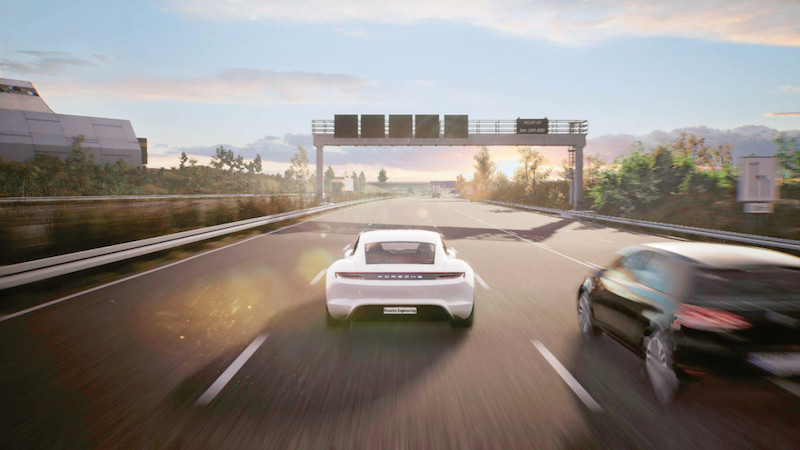Porsche Engineering developing ‘intelligent vehicles’ with computer games engines
Porsche Engineering, technology service provider and wholly owned subsidiary of Porsche, is using games engines from the computer games industry to develop the intelligent vehicle of the future.
Game engines – popular examples include Unity and Unreal – generate photorealistic images and ensure the physically correct behavior of objects in computer and video games.
Among other uses, Porsche Engineering utilizes these software packages for the virtual development and testing of highly automated driving functions.
This shortens development times, saves costs and makes mobility safer. In the Porsche Car Configurator, game engines are intended to support the customer in the configuration of his vehicle in retail.
Dirk Lappe, CTO of Porsche Engineering, says: “We use a wide variety of technologies to develop and test the intelligent and con-nected vehicle of tomorrow.

“Game Engines have a crucial role to play here, alongside artificial intelligence. They train driver assistance systems with synthetic sensor data. So every scenario and eventuality can be played out in detail.”
The algorithms of driver assistance systems require a lot of training and validation – and yet not every event that needs to be tested occurs during real test drives.
Lappe says: “Drives simulated with the help of Game Engines have the advantage that they can be repeated as often as required and can be controlled down to the smallest detail. In addition to real and virtual tests, Porsche Engineering also implements mixed forms: a real vehicle can react to virtual objects, for example.”
The use of Game Engines extends beyond the training of driver assistance systems: in vehicle design, they are used to reduce the number of real prototypes and thus save time and costs.
For this purpose, Porsche Engineering uses the Visual Engineering Tool developed in-house, which can be used on the basis of CAD data and augmented reality or virtual reality goggles to clarify questions about the optimal arrangement of components, for example, quickly and cost-effectively.
Game Engines will also further enhance the customer’s buying experience in the future. Porsche is currently testing a so-called Virtual Reality Car Configurator.
In the future, customers in Porsche Centers will see an almost photorealistic, three-dimensional simulation of their configured vehicle via a gaming PC with connected VR glasses.
With the new development methods, new types of employees are also making their way into the automotive industry.
Lappe adds: “Software developers with a gaming background are shaping the future of mobility, as are mechanical engineers and AI experts.
“The intelligent and connected vehicle is created by combining world-class automotive expertise with software expertise. We’re car geeks who love to program at the same time.”

